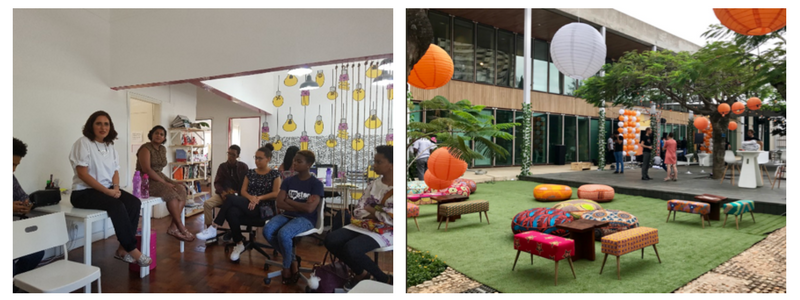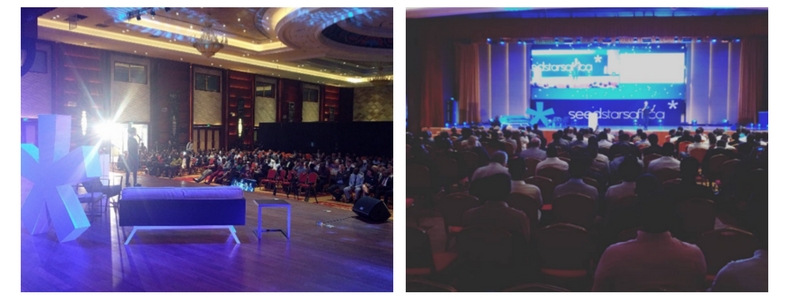Between 12 – 14 December, the GSMA Ecosystem Accelerator team was invited to take part in Seedstars Africa Summit. The regional event, held in Maputo, Mozambique, convened start-ups from over 20 countries in Africa. The event was a great opportunity for us to engage with some of the continent’s leading start-ups, corporates, governments, investors and other ecosystem builders as the year comes to an end. Here are four insights we picked up from the event and our meetings with several stakeholders from the Mozambique tech ecosystem.
1. Deep collaborations are the cornerstone of a sound tech ecosystem
Despite the noteworthy growth of Africa tech ecosystem, most investment opportunities remain centred around a handful of countries like Nigeria, South Africa and Kenya.
One takeaway from the summit was the need for a change in mindset. Ecosystem initiatives and builders were urged to stop thinking in silos and start developing multilevel stakeholder collaborations within and across African countries. To this end, Vuyisa Qabaka (Strategy and Growth Hacker at Entrepreneur Traction), advised entrepreneurs in earlier staged tech ecosystems/countries to seek the assistance and connections of more developed ecosystems like South Africa.
Reflecting on Mozambique’s ecosystem, Tiago Borges Coelho (co-founder of UX) encouraged local start-ups with a strong social impact to collaborate with donor funders, as this could serve as a stepping stone for entrepreneurs to launch viable businesses while tapping into donors’ know-how and relationships. Citing two of UX’s products (MOPA and Biscate) as cases in point, Tiago revealed that MOPA, a waste management platform, was developed using World Bank’s innovation grant for smart cities. He also referred to Biscate, a mobile platform that connects users with local informal workers through web and USSD technologies, currently growing in Mozambique with donor funding from the GSMA Ecosystem Accelerator Innovation Fund and support from local mobile operator Vodacom.

2. Mentors and tech hubs can catalyse the success of tech ecosystem
Frederico P. Silva (co-founder of UX) and Titos Munhequete (Founder of Izyshop) both expressed that one of the biggest needs of Mozambican tech entrepreneurs is mentorship. As the founders of two of the leading Mozambican tech start-ups, they echoed the importance of having technical and business savvy mentors who can advise budding entrepreneurs. Titos Munhequete mentioned that incubators and accelerators have a significant role to play in filling the mentorship void as they can help de-risk the investment opportunity for local investors while simultaneously equipping budding entrepreneurs with skills to scale a start-up.
During these three days in Maputo, our team had the opportunity to tour one of the country’s leading incubators Ideialab (picture below, left) and meet with its co-founders Sara Fakir and Tatiana Pereira. Founded in 2010, Ideialab provides a co-working space and tailored services to three main groups – Entrepreneurs, MSMEs and the Ecosystem. Some of the other incubators and accelerators include RLabs Mozambique, Maputo Living Lab and recently the launched Standard Bank incubator programme (August 2017). It was exciting to see that more organisations are developing initiatives to equip, incubate and accelerate local start-ups. We also had the opportunity to witness the launch of Orange Corners (an initiative supported by the Dutch Embassy) on 17 December. Orange Corners (picture below, right) aims to equip Mozambican founders with the skills to scale their start-ups. The hub will provide services such as mentorship, marketing, legal, accounting and other services. In addition to the rising tech hubs, there is a growing developer community with initiatives like MozDevs leading this way.

3. Start-ups need to understand mobile operators before seeking partnership
Over the three-day Seedstars event, we had the opportunity to run a workshop and a panel session focused on how start-ups and mobile operators can work better together. The workshop was used to take start-ups, mobile operator representatives and other ecosystem builders through our synergies framework as referenced in our guide Opening Doors: A Start-Up’s Guide to Working With Mobile Operators in Emerging Markets.
During the main stage panel session, Frederico P. Silva (co-founder at UX) and Jerry Mobbs (CEO of Vodacom Mozambique) highlighted how UX (on the Biscate product) and Vodacom Mozambique are collaborating in Mozambique, while Alain Nteff (Director of GiftedMom) and François Dufour (Start-up Development & Communication Director at Orange) shared with the audience how GiftedMom and Orange are working together in Cameroon.
Jerry Mobbs mentioned that start-ups should never assume mobile operators understand a start-up’s offering. He also mentioned that start-ups should put themselves in the mobile operators’ shoes when seeking partnership. Going a step further on this point, Orange’s François Dufour advised start-ups to think about partnerships with mobile operators in these two ways:
- Collaborate with operators to help them increase stickiness /customer retention, and
- Work with mobile operators so that both parties can benefit in terms of additional revenues.
Sharing the perspective of start-ups, Alain from GiftedMom insisted that start-ups should be patient and make sure they understand how mobile operators work before seeking partnership.


4. Entrepreneurs are using technology to address bottlenecks across various sectors
Seedstars presented us with the opportunity to connect with many start-ups from a wide range of African countries. It was eye-opening to see that these start-ups are solving bottlenecks across various areas and sectors. Some of these include:
- Agriculture – AgroCenta (Ghana): A market linkage platform that enables smallholder farmers to sell their produce directly to buyers
- Ecommerce – IzyShop (Mozambique): An online supermarket for grocery products that connects producers to the consumer market
- Employment – Jobberman (Africa): An online job portal where candidates can look for jobs based on location, salary and specialisation
- Education – M-Shule (Kenya): An adaptive learning platform that uses artificial intelligence and SMS to deliver personalised, accessible education
- Savings – MaTontine (Senegal): Digitises the traditional peer-to-peer savings circles (Tontines), in order to unlock access to financial services like small loans to the financially excluded
- Insurance – Tabech (Mozambique): Virtual mobile insurance service that uses mobile phones to access funeral insurance without the use of internet
- Health – Medsaf (Nigeria): Connecting pharmacies and hospitals with safe and cost-effective medications
- Religion – Asoriba (Ghana): A web and mobile platform that helps churches to better engage with members
- Transportation – myRunner (Zimbabwe): A web and mobile solution that provides bus ticketing services
- Utilities – SolarCreed (Nigeria): Pay-as-you-go solar lights for your poultry farm

We would like to end this blog by thanking Fanny Dauchez, Claudia Makadristo, Anis Kallel and the broader Seedstars team for inviting us to participate in the Seedstars Africa Summit. We would also like to thank the local organiser and host UX Information Technologies.
The Ecosystem Accelerator programme is supported by the UK Department for International Development (DFID), the Australian Government, the GSMA and its members.


